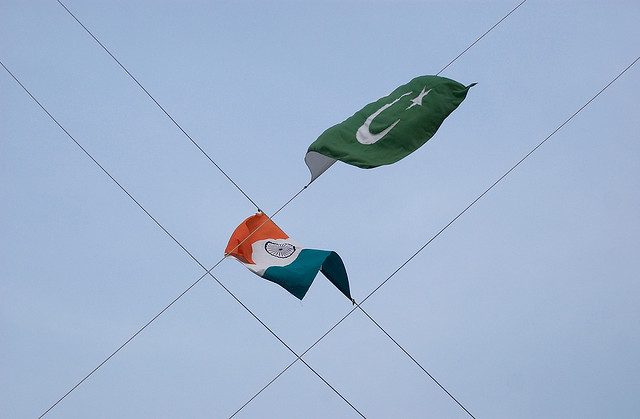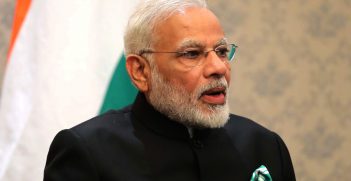Pakistan and India: Creating an Enemy

In the 70 years since independence from British colonial rule, the acrimonious relationship between India and Pakistan has been marked by intense ideological differences.
At the time of India’s independence, its political establishment under Jawaharlal Nehru embraced ethnic, linguistic, religious and cultural diversity. This was encapsulated in the phrase ‘unity in diversity’. Nehru’s approach allowed the state to offer social and political space to each of the princely units that acceded to India, including Kashmir, a Muslim-majority state with significant minorities. The idea of adopting secularism as an ideological foundation also reflected both Nehru’s rejection of religious nationalism as well as his refusal to grant any entitlements to religious groups.
By contrast, Pakistan’s founder Muhammad Ali Jinnah demanded the creation of a separate homeland for Indian Muslims based upon his two-nation theory. Jinnah argued that Hindus and Muslims constituted two distinct nations and that Pakistan would protect Muslims from the perceived oppression of a Hindu majority following the end of the British Raj.
As per the two-nation theory’s prescription, the ruling elite’s embrace of Islam as the state’s ideology enabled them to use religion as a political tool to promote a national imaginary of “unity as uniformity”. This interwoven politico-religious narrative served the interests of the political establishment and later the military’s to distinguish the ethos and identity of Pakistan from India’s.
As these processes gained traction, the promotion of Islam within state and society came at the cost of more secular and plural principles, while handing religious parties and their conservative allies a mandate to steer Pakistan in their desired direction. One of the key ideologues that championed for Nizam-e-Islam—the setup of an Islamic system—was Abul Ala Maududi, the founder of Jamaat-e-Islami (JI). Maududi designed Pakistan’s comprehensive transition into a theocratic state, arguing that non-Muslims had to be wiped out, and that a heterogeneous political and social environment would be a threat to Pakistan’s existence.
These developments meant that Pakistan increasingly identified itself as an Islamic state. In 1949, Pakistan adopted the Objectives Resolution which declared the objective of Pakistan’s constitution to be the creation of an Islamic state. The passing of this resolution overlooked protests from Pakistan’s minority population and effectively barred a minority citizen of Pakistan from ever holding the post of either the prime minister or president given that Pakistan’s constitution requires a Muslim to hold both positions.
According to Farhanaz Ispahani, one of the tragedies that stemmed from the promulgation of national narratives of Pakistan as a successor state to South Asia’s Muslim conquerors (who had ruled India for almost eight centuries before the arrival of the British), was that it framed relations between India and Pakistan as a continuation of a centuries-old conflict between Muslims and Hindus. Ispahani notes that it presented minorities as internal threats, particularly Hindus as conspirators whose loyalties were across the border.
The notion that minorities could not be trusted or loyal toward Pakistan, and hence Islam, gave licence and oxygen to groups like JI and others to enforce the literal meaning of Pakistan as ‘Land of the Pure’, in effect to ‘purify’ Pakistan of its rich cultural, religious, linguistic diversity and heritage. One of the most notable opponents to speak out against Pakistan’s drive towards an exclusionary Islamic identity was Huseyn Shaheed Suhrawardy, a former premier of Bengal and a prominent member of Jinnah’s Muslim League. Suhrawardy cautioned his colleagues about how Pakistan’s Islamic identity risked portraying India as a permanent threat.
Pakistan’s lawmakers and generals ignored warnings on the use of Islam for political purposes and instead opened the door for Islamism to shape the nation’s body politic. Among them, General Zia-ul-Haq’s tenure from 1977 to 1988 marked a unique turning point in Pakistan as he allowed Saudi Arabia’s Wahhabi brand of puritanical Islam to take root.
As Wahhabism rejects plurality within Islam, regards Shia Muslims as heretics, and seeks to purify Islam of any innovations or practices that deviate from original teachings and practices, it became commonplace to portray India and indeed Hindus as an existential threat that were working to undo Pakistan. This message continues to be disseminated through Pakistan’s national social studies curriculum.
Two eminent Pakistani scholars, A.H. Nayyar and Ahmed Salim, recognise that this contributes to the incitement of religious extremism, glorification of armed jihad, and spreading of a reductionist world view. Consequently, the proliferation of a Wahhabi-inspired ideology has contributed to the generation of a hostile image of India and of a lethal intolerance towards Pakistan’s minorities. It also serves to keep the objective of annexing Kashmir alive.
Pakistan’s distortion of its own history continues to be a powerful tool for advancing an enemy image of India to further Pakistan’s political and ideological agenda. As Nayyar and Salim warned, Pakistani school textbooks are riddled with inaccuracies, omissions, falsifications and fabrications. They cautioned that such material is being rewritten to propagate a militant Islamic culture, which is reshaping the value system of generations of children in ways that will have profound consequences for Pakistan’s stability.
Similarly, a former Pakistani Chief Justice, Muhammad Munir, pointed out that Jinnah “never used the words ‘ideology of Pakistan’” to highlight its invention as a post-independence phenomenon. More accurately, a single JI legislator coined the phrase 15 years after independence in 1962, claiming that the “ideology of Pakistan was Islam”. However, the wrongful attribution of the “ideology of Islam” to the founding father of Pakistan has given the myth an air of untouchability and has cemented the nation’s Islamic self-conception, making the adversarial depiction of Hinduism even more strident. As emphasised by Nayyar and Salim, “For the upholders of the ideology of Pakistan, the existence of Pakistan is defined only in relation to Hindus, and hence Hindus have to be painted as black as possible.”
The diffusion of the ‘ideology of Pakistan’ ensures that there is a perpetual ideological difference between Pakistan and India, which its promoters claim is irreconcilable. This reinforces the enemy image of India and concurrently inflames fundamentalism in Pakistan as demonstrated by innumerable attacks on its religious minorities.
Looking back at Suhrawardy’s warning, it can be said that the rise of fundamentalism in Pakistan is a natural manifestation of the two-nation theory, because when religion is the basis for the creation of a state, religion itself cannot be carved out from the state’s reason of being. So long as the ideological Pakistani state narrative continues to be reinforced and injected into the minds of its people, the idea of India as an enemy is likely to overshoot a century. The tragedy of the proliferation of a malign image of India in the Pakistani mindset is that it provides it with a justification to pursue a revisionist agenda against India; this will make improving relations with New Delhi significantly challenging, if not entirely impossible.
Dr Nishank Motwani is a visiting fellow at the Asia–Pacific College of Diplomacy at the Australian National University. He carries out research on transnational conflicts, international and regional competition and cooperation and the regional dynamics of conflict persistence in South and Southwest Asia.
This article is published under a Creative Commons Licence and may be republished with attribution.





